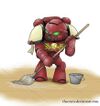Plot Armor
>
Plot armor is the ultimate, logic/odds-defying plating that can be outfitted on any Player character. Plot armor is rarely absent in any role-playing character, and it basically allows a character to survive situations that would outright kill anyone and/or anything else, such as surviving a nuclear blast outside a shelter inside a refridgerator, or fending off thousands of elite warriors without so much as getting a wound. In games, such as D&D, players often have many abilities that provide Plot Armor, since delving through dungeons and slaying monsters would get most people killed. In time-travel stories, the character might be known to exist at some point in the future, making this person impossible to kill before that event occurs.
In short plot armour in sci-fi and fantasy stories is done to allow a writer to tell a story, as the main character or characters being killed off too quickly might impede the great work the author imagines, even if said situations grow a little too improbable (especially if super demons or full on nuclear attacks are involved). Heck, the universe has thrown every monster horror in its basement at the Doctor and he just can't be killed (well, permakilled. He's died 13 times in the past 2100 years, which is still a hella long lifespan).
Forms
Plot armor can take many forms:
- hidden die rolls that "miss"
- surprise reinforcements
- some type of armour/clothing that renders most/all attacks useless or inert on the wearer
- Bedouin Rescue Service, unlikely rescue from a hostile environment, often a desert hence the name, or situation.
- Deus Ex Machina: A specific form of Plot armor can be the clumsy use of a Deus Ex Machina. A Deus Ex Machina or, "god from the machine" means a macguffin,a widget or some thing that utterly solve the problems of the story like the opposite of Old Man Henderson. Example: the common cold killing all the Martians in the War of the Worlds (which is also one of the few time a Machina has been used well). A Deus Ex Machina is armor FOR the plot and makes sure that out come the GM or author wanted to happen, Happens.
- Notably the German author Walter Moers had a a character called Dues X. Machina whose job is going around the world saving people's lives at the last minute.
In role-playing games, there can be a mechanism for plot armor, where player characters (and potentially very important NPCs) have "fate" or "karma" points that can be spent to offset bad rolls or shrug off injuries, or just many more hit points than anything else around them.
Individuals who wear the armour of all-defying-protectiveness
Please remember that, though all Mary Sues carry a full plate of impossibly well-crafted Plot Armour that covers every inch of their bodies, Plot Armour doesn't need to indicate a character is a Mary Sue. Most main characters have this extra protection from the author of the story in question, and without it there wouldn't be a story about this strappin' young lad who beats the odds and wins the prize - he would just die like some nobody because nothing makes him able to do his magic. So, this list is a list of people who seriously overuse the Plot Armour they are given like proper Suies, not actual users of it. If we were to make a list of those, we would have to list every fucking main character ever created since the Epic of Gilgamesh.
Exceptions: Players voluntarily dropping advantages similar to Plot-Armor
While almost all stories fail to ignore the infamous Plot-Armor, experiencing an adventure almost without it and without similar influences is actually possible, especially PC versions of certain /tg/ games. There are some gamers who put themselves into challenges that get considerably close to an "authentic" adventure, at least relatively.
You will have to pick a game that already has very weak Plot-Armor by itself. You can identify them by characteristics such as these:
=> No battles are fought for you
=> No hopeless situations are solved in cutscenes
=> The main character doesn't have any considerable powers higher than NPCs of the same level/equipment
=> Dialogue options and behavior has logical consequences that can be ruinous
One of the best examples for this is the Baldur's Gate series. With only very few (and minor) exceptions, all challenges in the story are thrown at you, not at a sequence you can lean back and watch. At best, one can only honestly blame it for a few story/logic inconsistencies performed by opponents. Dark souls is another example of no plot armor, if you want to advance and complete the game you must have real skill, no relying on fate to give you a lucky hit, other wise you will die, over and over and over again. Of course Dark souls has a steeper learning curve than Mount Rushmore which shows that plot armor has it advantages when telling a story.
While absolutely not tied to any plot, the most important and difficult step is one of tremendous discipline: the so-called "No-Reload Challenge" which basically only allows you to load a savegame to continue playing, never to rewind a death or similar unfavorable outcome. Add increased difficulty and a few mods onto this, and if you survive a game like Baldur's Gate without a million repeated attempts, you're (mentally) ready for lethal adventure. We're speaking of a true far cry from modern games here, a game that throws your 4-10 Hit Point Character into a world where your stereotypical lowlevel wolf enemy hits you for 17, bears for 32, and where early story "assassins" are not the dumbed-down incompetents you know, but out-level you by ridiculous amounts.
